Our peer to peer support panel is made up of women that are BRCA positive and have learned to cope with their diagnosis, and as a result, have made the decision to aid other women in their BRCA journey. Read their stories below.
Melissa Nolan
Jean O’Neill
Lisa McElwaine
Tina O’Sullivan
Cara Brady
Sarah Donovan
Maria Elliot
Majella Hickey
Francine Costello
Emer O’Shea
 Melissa Nolan
Melissa Nolan
I feel privileged to have trained as a peer support volunteer with the Marie Keating Foundation. I have had a longing desire to help other people on their BRCA journey from pre test through to post surgery and share my experiences in helping people at a very difficult time.
I have a strong family history of breast cancer and I tested positive for BRCA1 in October 2014. The result was almost a relief. A relief from the wait between test and result. Not having cancer but having this diagnosis threw me into a no mans land category. I attended a breast clinic and was made to feel I was wasting time and what was I doing there. I found this lack of a defined model of care to refer to very difficult to get my head around and there was a lack of knowledge as to “what to do with me”. I became guilty at being in a waiting room amongst women with cancer when I had no symptoms. I was trapped in a medicalised world but I wasn’t sick.
The language spoken was cancer, but I had no cancer however if I didn’t do something about this, I was very soon going to develop it.
Following a change of GP, I happened upon a team who heard me, valued my proactive decision to reduce my risk of cancer. A series of referrals led me to all the right consultants who recognised my decisions and were knowledgeable and passionate about BRCA.
I had a total hysterectomy in Feb 2015, followed by a double mastectomy in 2017. I chose not to have reconstruction, and this was a very personal choice and I have no regrets choosing to remain flat.
I was lucky in a way as my surgeries could be planned, I had time to research all the possible pros and cons and Dr Google threw up plenty of worst case scenarios! I had huge support network from family, friends and colleagues. I was open about my journey and people said I was brave, something I strongly refuted. Brave would be knowing you had the gene and doing nothing about it. All I did was react and make a series of positive decisions.
The surgeries are huge , they are a big deal on so many levels. My surgeons were excellent in preparing and explaining every step of the way clinically and surgically. The missing link in the pre and post surgery days and what I hope we as a group of women can mobilise more resources for is the gap re emotional and psychological supports.
I knew how long on average my surgeries were going to take, what the aftercare would be, what pain relief I would have etc, but the emotional impact was under explored. What and how would I tell my teenager, how going into a surgical menopause was going to affect me and a myriad of other what if’s and other emotions?
This is an area that I believe as a peer support volunteer I can offer some support to other men and women. I can be the ear to listen to those niggly worries and questions at the back of your mind that maybe you think are too stupid to ask a busy consultant, I can offer reassurance and practical advice based on my own experience and the route I took and in time I hope we will have a suite of resources to offer people and point them in the right direction for further information and psychological supports.
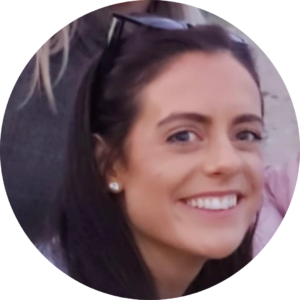 Jean O’Neill
Jean O’Neill
“With a BRCA gene mutation, you almost feel like you don’t fit in anywhere, and that you’re taking resources away from people that have a cancer diagnosis. But when I found the Marie Keating Foundation, and heard Aisling speak at their conference, I felt like I had finally found somewhere I fit in.”
Cancer had always been in the background of Jean’s life. Over the years, Jean’s mother had been diagnosed with breast cancer on three different occasions and it was always something that played in the background of her childhood and into her adulthood.
After her third diagnosis, Jean’s Mam changed consultants, and her new team suggested that due to her history, she go for genetic testing. The results came back and Jean’s Mam was identified as a BRCA2 gene carried.
“That was devastating” Jean explains. “When Mam came back as positive that really upset me. So much so that when I went for testing and my results came back positive, I almost felt numb.”
As an only child, Jean and her mother were the only people she knew that had a BRCA gene mutation. On the advice of their genetic counsellor, Jean was then admitted for regular screening to ensure she stayed healthy.
“I was actually okay for a few years. I went for my breast checks, MRIs and ultrasounds and was able to live my life as normal. It was only really when the MRIs moved to every six months and the call-back appointments for follow-ups became more frequent that it really started to encroach on my regular life and I started to think seriously about risk reducing surgery.”
In the autumn of 2020, Jean’s world was once again rocked when her Mam was diagnosed with cancer of the peritoneum.
This was the toughest diagnosis for Jean and her family.
“She had been well for over eleven years, and we really thought that part of our lives was behind us, but it wasn’t and that I think is what scared me the most. I moved home to spend time with my Mam and Dad and I think it was around then that I really decided to go ahead with the mastectomy. I just knew that I didn’t want the life of cancer treatment and illness my Mam had gone through, and in November 2021 I went ahead with the surgery.”
At 34, Jean made the decision to have a double mastectomy with immediate reconstruction. This was the same age as my Mam when she had her first breast cancer diagnosis. While it wasn’t easy, she came through the surgery well and is happy with her decision today.
“The surgery is drastic, its body and life changing, but it was a way for me to alleviate the dark cloud of worry that can sometimes hang over you when you’re a BRCA carrier, so I found it really worthwhile for me.”
Jean first became aware of the Marie Keating Foundation through our annual BRCA Conference. While she had received tremendous amounts of support from her family and friends, Jean attended our Conference as a way to find reliable information about BRCA as well as engage with a community who understood her experience.
“When I heard Aisling speak at that first conference, I finally felt like I fit in. We were close in age, and I related so much to her experience, and where she was coming from. I also found a huge amount of information surrounding surgery options and screening, family planning and fertility and much more that I hadn’t been able to find anywhere else. Everything came from the Marie Keating Foundation. It’s with them that I found their online support group, and later their Whatsapp group, and now, I’m in the position where I can pass on the support I’ve received as one of their new Peer to Peer supporters.”
When asked what advice she would give to others that test positive for a BRCA gene mutation, Jean says;
“BRCA is something you live with. It has its ups and its downs, but at the end of the day, it’s just something playing in the background. I’ve never looked on it as a death sentence. With the right support, and information, you can live an extremely full life, you just need to make sure you take the time to sit, and figure out what the right path is for you.”
Lisa McElwaine
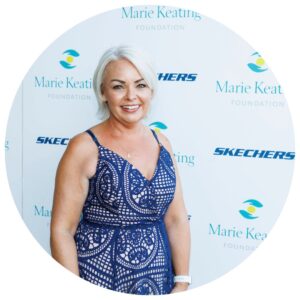 “In January 2020 I was diagnosed with Breast Cancer and had A Lumpectomy in February 2020 & had to start Chemotherapy on the 4th April 2020 right at the beginning of Covid, it was very hard as I had to go to all my treatments on my own. After Chemo, I started Radiotherapy in August 2020 for nearly 5 weeks. I found this treatment emotionally difficult as again I was on my own and was with other people who had others types of cancers which I wasn’t expecting to see especially Children, it was heart breaking.”
“In January 2020 I was diagnosed with Breast Cancer and had A Lumpectomy in February 2020 & had to start Chemotherapy on the 4th April 2020 right at the beginning of Covid, it was very hard as I had to go to all my treatments on my own. After Chemo, I started Radiotherapy in August 2020 for nearly 5 weeks. I found this treatment emotionally difficult as again I was on my own and was with other people who had others types of cancers which I wasn’t expecting to see especially Children, it was heart breaking.”
After I finished my treatment I was back with my Oncologist who told me my last CT was Crystal clear – words I will never forget. But to tick all the boxes and give me the best chance of living life to the full she wanted me to go for genetic testing for BRCA because of family history on my Mams side. That appointment was Nov 2020 a Day I will never ever forget, I met with David Gallagher and Eoin Hanney and it was explained to me what the test meant and what it would mean if I was BRCA positive which they said I was highly likely to be because of my cousin and my Uncle. The results were going to take a number of weeks so with Christmas approaching we said as a family we would have the best one even though Covid was around.
Unfortunately Covid did hit our family on 27th December and 1 by 1 9 out of 12 in our bubble became positive. My poor Dad got it the worst and Very Sadly he passed away on the 6th January 2021 after 5 days being sick and 36 Hrs in Tallaght Hospital. Our world crumbled into a million tiny pieces – The Rock of our Family was gone…..
The following week I got the results from my BRCA testing to confirm I was positive for the BRCA2 Gene Mutation. Another roller-coaster to face and a road of big decisions for me and my family. The right thing for me was to have both preventative surgeries as soon as I could to reduce my risk of cancer coming back.
My connection with the Marie Keating Foundation started in Nov 20 when I was recommended by a friend to register for the Survive & Thrive which thankfully after a lengthy conversation with Helen Forristal I was accepted for their next programme starting in January. It couldn’t have come at a better time for me with the passing of my Dad. I was in a very bad place and Helen kindly persuaded me to join just for the first week and if I felt uncomfortable or wasn’t able for it she’d sign me up for the next one instead. My god my eyes opened to a huge support network from girls just like me all needing the strength & encouragement from each other. It was the start of the making of me and giving me strength & positivity to get back to living a somewhat normal life again for me and my family.
After that I was introduced to Bernie Carter who runs the BRCA Support Programme which I joined and have so much support from this group with a BRCA diagnosis. I told my story on their virtual BRCA Conference in 2021. I am now trained as a Peer2Peer Supporter to help woman & men in the future who have little or no support.
As a little thank you to the MKF for their help and support I also told my story on their Concert 4 Cancer in 2021. I think it is so important to make people aware that Cancer is not a totally frightening and that there is so much support within the Marie Keating Foundation.
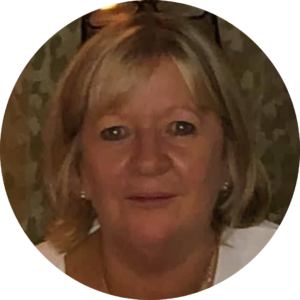 Tina O’Sullivan
Tina O’Sullivan
Growing up as a child and young adult I was very aware of the word Cancer, but as a family we did not speak about it, as my Mum died from Breast Cancer at 35yrs and my father from Prostate Cancer at 64yrs. Both of my parent’s cancers are associated with BRCA which made it difficult to ascertain which side of the family I inherited the BRCA1 gene mutation.
I discovered I had BRCA1 while I was receiving treatment for my second breast cancer. I found the unenviable task of telling two large families extremely difficult. In particular, having to convey information with possible ‘life changing’ implications was stressful, as naturally I was met with doubt and reluctance.
A ‘Walk in my Shoes’ scenario. The exceptionally long waiting times for the genetic testing did not help matters and was difficult for the family.
When I received my diagnosis in 2014 there were no BRCA support groups available, so I reached out to some wonderful ladies who had just gone through the preventative breast surgeries. I will always be incredibly grateful to them for sharing their experience with me. At the time, I was overwhelmed with all the different surgeries available and what was the right one for me. I felt I was in panic mode, like a ticking time bomb, particularly having had two breast cancers and a close call with Ovarian cancer. I knew this decision was particularly important as it would affect me for the rest of my life. I found a few helpful ‘Breast Reconstruction’ books online, as the information from the hospital was limited, but meeting face to face with other BRCA patients was invaluable, particularly hearing information you cannot always find in the books.
After my Cancer treatments, breast surgeries and then the preventative surgeries; Oophorectomy and Double Mastectomy with DIEP reconstruction, I was struggling with a number of side effects. At this time, the lack of medical supports available to me caused a lot of frustration, as I was forever searching for answers and solutions. When I attended a ‘Cancer Research lab tour and survivorship workshop’ in the UCD Conway Institute I found it very interesting and enlightening. I was then invited to become a member of the ‘Patient Voice in Cancer Research Steering Committee’ and through the PVCR I heard about the BRCA Link (NI) conference in Belfast. This was the first time I heard a wide range of important medical information in relation to BRCA from a team of consultants presenting together. It was also great to meet other BRCA families and to realise you were not on your own. Within a short time, the very progressive Marie Keating Foundation set up a BRCA Support Service in Ireland. I first joined the MKF online support group during COVID and their wonderful BRCA WhatsApp support group. When they invited me to become a peer-to-peer support person I was delighted, as I truly feel no person should have to go through this journey on their own.
As a cancer patient for many years, I am very mindful that every person’s experience is quite different and very personal. It can be extremely difficult reaching out and asking for support, particularly when you are feeling unwell, upset, and your entire world has turned upside down. I also hear a lot of patients saying that after their treatments and surgeries they feel a huge void and sometimes feel lost. I believe by sharing our experience and information we can support each other, give reassurance and help to navigate this journey together.
Cara Brady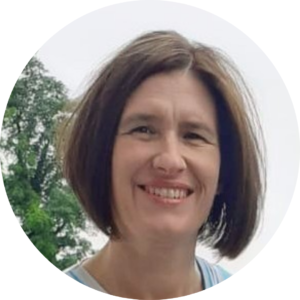
I felt quite alone after I received my genetic test results & it was so beneficial to find out about the Marie Keating Foundation & the support they provide to anyone impacted by a BRCA gene mutation.
I was aware that there was a history of breast cancer on my Dad’s side of the family going back at least three generations. My aunt had breast cancer & was later found to have the BRCA1 gene mutation. Testing showed that my Dad also had the mutation. I received my genetic test results in October 2019, confirming that I also have the BRCA1 gene mutation.
As I had already finished having my family, I decided to go ahead with the bilateral salpingo-oophorectomy first. This was done in March 2020 & I went on to HRT after the surgery.
I found it more difficult to make the decision regarding the double mastectomy & reconstruction, so initially I had surveillance via mammograms & MRIs. Listening to others share their experiences at the online support meetings was a great help & having explored the reconstruction options available, I went ahead with breast surgery in December 2021. Pre-cancerous changes were found in both breasts so it was a relief to have the surgery completed. I’m grateful to have been in a position to take preventative measures to reduce my cancer risk. I’m also thankful to the Marie Keating Foundation for the support they have provided & the amazing people I have met. Becoming a Peer to Peer support volunteer will hopefully enable me to give something back & help others in a similar position.
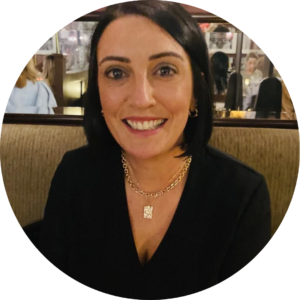 Sarah Donovan
Sarah Donovan
“I think if I hadn’t have had cancer, and got the news that I had this gene, I’m not sure how I would have reacted. It sounds strange, but my BRCA mutation almost gave me a reason for why I was diagnosed with breast cancer so young, and that was a relief. That I could put a reason to it.”
Diagnosed with triple negative breast cancer at just 37, Sarah’s journey with BRCA started just before the COVID-19 pandemic hit, in 2019. She shares her story and trained as Peer to Peer to make people more aware of what BRCA is, and the implications that come with a positive BRCA test and help support them in navigating this new awareness.
“I had heard about the BRCA gene because of Michelle Heaton and Angelina Jolie, but it wasn’t ever something I thought about. When I was originally diagnosed with breast cancer in May 2019, because I was so young, my oncologist suggested I go on for genetic testing. I didn’t think too much about it at the time, as I was more focused on treating my cancer, but I went in anyway and I ended up getting my appointment in July from James’.”
In September 2019, Sarah received the news that she did in fact have a BRCA 2 Gene mutation and there would be decisions she would have to make to help reduce her risk of developing cancer in the future.
“I was lucky in a way that I got my results before I had surgery for my cancer. I was a candidate for a lumpectomy, but because I was BRCA2, we decided to go with a double mastectomy to avoid kicking the problem down the road. When I found out I had the BRCA gene, I was like a dog with a bone. I told the genetic counsellor in St. James’ I wanted all the surgeries done. It was more so for peace of mind, I just wanted them to take what they had to take so I could get on with things, and have that burden and anxiety off my back.”
Because Sarah had been diagnosed with cancer, she needed to remain flat after her mastectomy to accommodate additional radiotherapy needed to combat her cancer. Her original gynae surgery was scheduled for April 2020, but due to the COVID-19 pandemic, this was pushed back to July 2020. Sarah then had her breast reconstruction surgery in July 2021, marking the end of her risk reducing surgery journey.
As Sarah already had two children, she says the decision to go ahead with having her ovaries removed was an easier decision for her. However, having a family during and after a BRCA gene diagnosis is not without it’s challenges.
“I have two kids, so at the moment I’m trying to weight up the decisions of whether to tell them early, or to wait until they’re 18. I’m torn because when I was in having chemo, there were girls in their 20’s having treatment for breast cancer, and because I was diagnosed young, I want to give them the information they need, without making them feel like they are ticking time bombs. It’s difficult.”
Sarah suspects that the BRCA gene came through her father’s line as Sarah’s mother went for private genetic testing and tested negative. Sarah’s father had a melanoma removed a number of years ago (those with a BRCA2 mutation can experience a heightened risk of melanoma). However, other than melanoma, no one else in Sarah’s family has been diagnosed with cancer to date.
Sarah is the kind of person that once she had made a decision “there is no going back”, and as a result, she has managed much of her treatment, appointments and support services herself. When looking for information surrounding BRCA Risk-reducing surgeries, she originally came upon the Marie Keating Foundation as one of the only outlets of accurate information and support for the BRCA Community in Ireland.
“I attended one of the Foundation’s virtual BRCA conferences during COVID and I found that invaluable. This is where I got most of my information and it helped me feel secure in the decisions I had made when it came to facing menopause and all the other things that come with BRCA. I also went through the Foundation’s Peer to Peer support network and spoke to one of their volunteers and it just put my mind at ease. I’m now a member of their Online BRCA support group, and I love that I can dip in and out of meetings and that my life doesn’t need to be consumed by this one part of me.”
“The Marie Keating Foundation has been one of the only places I found that provided up to date, and supportive information for people with a BRCA gene in Ireland. The ladies in our group are much more than a support network, we are there for each other, share information and keep each other up to date on all things BRCA. It’s nice to know that you are not in this alone, as sometimes that is how it can feel, and that you have a network of people, all different ages, from different places, some with a cancer history, some not, all coming together to support each other. It’s a club no one wants to be in, but we’re here now, so we might as well make the best of it.”
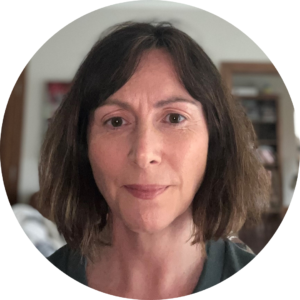 Maria Elliot
Maria Elliot
“Hi, my name is Maria and I have the BRCA 2 gene alteration. The alteration was passed down to me by my father unfortunately he has passed away before he knew that he carried it. I became aware of the possibility of carrying the alteration after two of my Father’s sisters were tested they both had ovarian cancer. I was the first member of my family to be tested and it came back positive since then both of my sisters and one cousin has tested positive.
I was 47 at the time coincidentally the same age as my paternal grandmother when she died of breast cancer. I had finished having children so it was an easy decision to have my bilateral oophorectomy, I am still navigating the world of surgical menopause but I am glad that I was able to protect myself again ovarian cancer.
It took a little bit longer for me to consider my options for reducing my risk for breast cancer, I had a couple of mammograms and one MRI to start but then as the months went on I decided that I couldn’t live with the uncertainty. I found the Marie Keating peer to peer support group fantastic I spoke to three ladies all with different stories and perspectives and it really helped me see the future of living with this diagnosis no matter what option I decided to take. It can feel like a very lonely and dark journey at first especially if you are one of the first in your family to deal with it, talking to others that have walked the walk and thrived is comforting and empowering.
I decided to have my double mastectomy with implant reconstruction in Limerick Regional Hospital in 2022. I was very fortunate that all went well and while the recovery is challenging it is possible and although I may not look exactly like I did before for me the benefits outweigh the challenges. I am now at a stage where I can support my younger sisters and support them in their decisions. I am delighted to be a peer to peer counsellor and give back to the BRCA community that I now call my friends.”
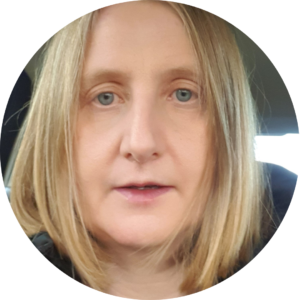 Majella Hickey
Majella Hickey
“I was diagnosed with breast cancer on 5th August 2022. I underwent a lumpectomy in September 2022 followed by six rounds of adjuvant chemotherapy in November 2022. During my first consultation with my onco-surgeon, he recommended that I undertake genetic testing for BRCA as there was a strong history of breast, prostate, skin, and pancreatic cancer in my late mother’s family. He carefully explained what a positive test result would mean for me and how this might impact my decision to complete breast conserving therapy.
The results arrived three weeks later: I was positive for the BRCA 2 gene mutation. Despite my earlier meeting with the onco-surgeon, the news took me totally by surprise. I had not expected a positive result and as I looked into my husband’s eyes, I knew exactly how life changing this news was for me.
My medical team discussed the options based on my genetic testing results. The first option was, post chemotherapy, to proceed to adjuvant radiation therapy and thereafter commence a high-risk surveillance programme. The second option was to undergo risk reducing surgery in the form of risk reducing bilateral mastectomy and immediate reconstruction. I knew I was going to need time to explore the option of preventative bilateral mastectomies versus surveillance. Was I ready to accept the altered body image and the lack of sensation in my breast?
My first reaction was to reach out to my sister. She surfed the internet and found a wealth of resources, on the Marie Keating Foundation website, including an online peer support group and mentoring service. I was matched with a mentor within days of enquiry. It was wonderful to speak with someone who had a BRCA 2 mutation for the first time. Her story was a source of inspiration to me. Listening to others share their experiences at the online support meetings was also a wonderful help in my decision-making process.
I took the decision to undergo a risk reducing bilateral mastectomy and reconstruction in May 2023. A bilateral salpingo – oophorectomy was completed in August 2023. Both surgical procedures were successful.
As difficult as it was to learn that I had a BRCA 2 gene, I will never forget how grateful I felt to have the support I received from the Marie Keating Foundation. I really hope that by sharing my story and my time with others, that I can return the support that was given to me.”
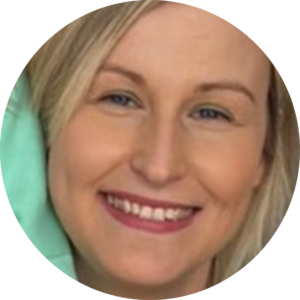 Francine Costello
Francine Costello
My name is Francine Costello.
“I was diagnosed with triple negative breast cancer on the 21st January 2022. I will never forget hearing those words ‘it’s cancer’. I clutched my husbands hand and went to pieces. I wasn’t listening to anything, all I could think of were my two girls who were 2 and 4 at the time. We were in the middle of building a house and I had started a job I loved. They assured me it was caught early and my prognosis was good.
It took us a few days to digest it all. Family and friends were amazing. I got my treatment plan and on the 18th February I started chemo. I would have 16 sessions in total.
I underwent a double mastectomy in August 2022 with immediate reconstruction and had my ovaries and tubes removed in April 2023.
We also had genetic testing and I found out I was a carrier of the BRCA2 gene. This felt like another slap in the face for me. I was so angry.
The Marie Keating Foundation has been an amazing support to me and I always have someone to talk to. They made BRCA less scary and supporter me whenever I needed it.
I am now cancer free and living my best life with my amazing family and friends.
I wanted to share my story to raise awareness. I would not have found this lump if I had not been looking. Please make time to check. A simple few minutes could save your life. I am so grateful to be here.”
You can read Francine’s story in full here:
https://surviveandthrive.ie/cancer-stories/francine-costello/
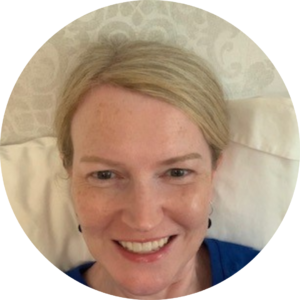 Emer O’Shea
Emer O’Shea
“Growing up in my family there was an awareness of cancer as one of my aunts had died of cancer before I was born. When I was a teenager, I remember the complete shock it was to my mum that another aunt was diagnosed with ovarian cancer in her late forties. Following this my mum had risk reducing surgery, ( BSO and hysterectomy). Sixteen years later in 2001 following many months of vague but annoying symptoms like bloating and loss of appetite they found ovarian tumours in her peritoneal cavity. We simply could not believe it. Unlucky was the word the doctors kept using but it felt like something more than bad luck was at play. Her cancer was very aggressive and following three years of grueling treatment she passed away.
At the time I was living in the UK and tried to get genetic testing but couldn’t and when I moved back to Ireland I tried again but without a living relative with the disease it wasn’t possible or was prohibitively expensive. At this stage an uncle on my mother’s side had also died of prostate cancer. I was advised to have risk reducing surgery so in 2015 with my family complete I had a BSO. My GP was very proactive and when it was possible to have genetic testing covered by my insurance I went ahead and found out in Sept 2022 that I was positive for a BRCA 2 alteration.
Despite knowing it was likely it still came as a big shock to have it confirmed. The genetic counsellor was very kind and helpful but I found it overwhelming and all consuming. The Marie Keating Foundation website was where I ended up as I searched for accurate information and soon after finding out I spoke to one of the peers for support, attended online support meetings and the BRCA conference the following Spring. All of this helped me to come to terms with having the BRCA alteration and to make the difficult decision to have risk reducing breast surgery and reconstruction. Now that I am out the other side of the surgeries, I wanted to give something back and it is for this reason I joined the peer to peer support group. I hope I can help other women who are at the start of the difficult journey a BRCA diagnosis brings you on. It feels good to do something so positive with something that has a negative impact on your life.”

